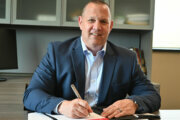ALLEN G. BREED
AP National Writer
Ebola isn’t leading American newspapers and newscasts much these days. Dr. Albert Wu thinks that’s not necessarily a bad thing.
If he was cynical, says the professor at the Johns Hopkins Bloomberg School of Public Health in Baltimore, he would suggest that it’s because the elections are over, and politicians no longer are inflaming hysteria over Ebola for their own purposes. “But I’m not feeling that cynical today.”
Maybe it’s the lack of new Ebola cases in the U.S. Maybe Americans have been distracted by other stories, like the midterm elections. But Wu and others say there are signs that Americans have retreated from widespread panic and have reached a kind of equilibrium when it comes to the disease that is ravaging parts of West Africa.
“It may not be on the front page in news, but I think it’s actually in the fabric now of the United States,” says Bruce Johnson, president of SIM USA, the North Carolina-based Christian mission group that has been at the heart of the Ebola story since the outbreak started earlier this year.
When Johnson went to the doctor this week, among the questions he was asked was whether he had traveled internationally within the past 21 days — the incubation period for Ebola. Whether the disease is on page one or page three doesn’t matter, he says.
“That’s never been asked before in the United States,” says Johnson, whose organization brought hospital volunteer Nancy Writebol and Dr. Rick Sacra back to this country for treatment after they were infected in Liberia. “That’s why I’m saying it’s woven into our fabric now.”
This is not to say that Americans are no longer interested in Ebola, or no longer concerned. According to exit polling conducted for The Associated Press during this week’s election, 59 percent of voters said they have followed news about Ebola extremely or very closely. Only 42 percent of voters approved of the government response to Ebola here at home.
News reports of suspected cases have declined. Last month, the AP told its clients that it would only report on suspected cases if it had “a solid source saying Ebola is suspected and some sense the case has caused serious disruption or reaction.”
Earlier this week, the Maryland Department of Health and Mental Hygiene announced that it would not be giving updates on the more than 100 people there who were being monitored for possible Ebola, unless one of them tests positive for the disease.
“Time has shown the Ebola hospital admission rumor to be an unreliable threshold …,” department spokesman Christopher Garrett wrote in an email. “As we head deeper into influenza season, we want people to guard themselves against a serious illness that poses a much more serious risk to Maryland’s public health by getting flu vaccinations.”
Wu thinks the state’s action “very prudent.”
“I think that there are likely to be many false alarms, and crying wolf on multiple occasions and creating more hysteria does not serve the public health,” says Wu, who is also director of his school’s Center for Health Services and Outcomes Research. “I think it can only lead to people rushing in ignorance and panic from one emergency department to another with the mistaken belief that that will somehow make them safer.”
Though Facebook added a button to its page this week to make it easier for users to donate to charities battling the disease, the American public’s response to Ebola has not matched its reaction to other recent crises around the globe. Franklin Graham, president of the charity Samaritan’s Purse, says donations have lagged far behind the responses to the tsunami in Japan, the typhoon in the Philippines or the earthquake in Haiti. He is surprised that there have been no telethons or Live Aid-style benefit concerts.
“I think anytime you deal with a disease, it’s a little frightening to people,” says Graham, whose organization helped secure the evacuation from Liberia of one of its own stricken missionaries, Dr. Kent Brantly. “And so we move on to another subject.”
Perhaps Wednesday’s Country Music Awards show in Nashville, Tennessee, offers one gauge of America’s current state of mind on Ebola. Co-hosts Brad Paisley and Carrie Underwood brought down the house with their parody about “the feisty little nurse in Maine” — Kaci Hickox, the health care worker who returned to the United States after treating Ebola patients in Sierra Leone, only to be confined in a tent by New Jersey officials before moving on to Maine, where a judge ruled she could not be forcibly quarantined.
Set to the tune of Dolly Parton’s 1973 hit, “Jolene,” one verse included the words, “don’t ride your bike, please don’t infect my man” — a reference to an outing on the streets of Fort Kent, Maine, followed by eager camera crews.
“Quarantine, quarantine, quarantine, quarantine,” Underwood sang as Paisley strummed. “What part of ‘stay inside’ don’t you understand?”
Hickox’s 21 days are up on Monday. Wu predicts that the media will no doubt be back to capture her emergence.
How long it takes her to emerge from Ebola’s shadow remains to be seen, he says.
“Hopefully, after that photo op, interest will wane in her,” he says, “and she can continue to do the, I would say, heroic work that she has been doing in the past.”
And if another case is confirmed on U.S. soil, says Johnson, Ebola will be front-page news again.
Copyright 2014 The Associated Press. All rights reserved. This material may not be published, broadcast, rewritten or redistributed.







